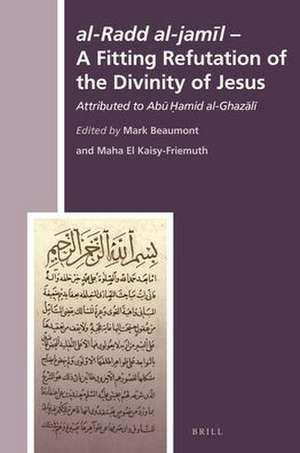<i>al-Radd al-jamīl</i> - A Fitting Refutation of the Divinity of Jesus: Attributed to Abū Ḥāmid al-Ghazālī: The History of Christian-Muslim Relations, cartea 28
Editat de Mark Beaumont, Maha El Kaisy-Friemuthen Limba Engleză Hardback – 28 sep 2016
This is a new critical edition of the Arabic text and the first complete English translation. The introduction situates this work in the history of Muslim anti-Christian polemical writing. Mark Beaumont and Maha El Kaisy-Friemuth argue that this refutation comes from an admirer of al-Ghazālī who sought to advance some of his key ideas for an Egyptian audience.
Din seria The History of Christian-Muslim Relations
- 18%
 Preț: 678.12 lei
Preț: 678.12 lei - 18%
 Preț: 892.97 lei
Preț: 892.97 lei - 18%
 Preț: 691.72 lei
Preț: 691.72 lei - 18%
 Preț: 695.88 lei
Preț: 695.88 lei - 18%
 Preț: 832.48 lei
Preț: 832.48 lei - 18%
 Preț: 1000.69 lei
Preț: 1000.69 lei - 18%
 Preț: 793.88 lei
Preț: 793.88 lei - 18%
 Preț: 685.99 lei
Preț: 685.99 lei - 18%
 Preț: 592.38 lei
Preț: 592.38 lei - 18%
 Preț: 606.83 lei
Preț: 606.83 lei - 18%
 Preț: 571.13 lei
Preț: 571.13 lei - 18%
 Preț: 640.09 lei
Preț: 640.09 lei - 18%
 Preț: 928.44 lei
Preț: 928.44 lei - 18%
 Preț: 640.09 lei
Preț: 640.09 lei - 18%
 Preț: 531.33 lei
Preț: 531.33 lei - 18%
 Preț: 527.42 lei
Preț: 527.42 lei - 18%
 Preț: 926.88 lei
Preț: 926.88 lei - 18%
 Preț: 1058.31 lei
Preț: 1058.31 lei - 18%
 Preț: 972.46 lei
Preț: 972.46 lei - 18%
 Preț: 863.90 lei
Preț: 863.90 lei - 18%
 Preț: 1234.22 lei
Preț: 1234.22 lei
Preț: 585.19 lei
Preț vechi: 713.64 lei
-18% Nou
Puncte Express: 878
Preț estimativ în valută:
111.99€ • 121.60$ • 94.07£
111.99€ • 121.60$ • 94.07£
Carte indisponibilă temporar
Doresc să fiu notificat când acest titlu va fi disponibil:
Se trimite...
Preluare comenzi: 021 569.72.76
Specificații
ISBN-13: 9789004321533
ISBN-10: 9004321535
Dimensiuni: 155 x 235 mm
Greutate: 0.43 kg
Editura: Brill
Colecția Brill
Seria The History of Christian-Muslim Relations
ISBN-10: 9004321535
Dimensiuni: 155 x 235 mm
Greutate: 0.43 kg
Editura: Brill
Colecția Brill
Seria The History of Christian-Muslim Relations
Cuprins
Foreword
The Context and Authorship of al-Radd al-jamīl
- The Context of al-Radd al-jamīl
- The Authorship of al-Radd al-jamīl
- Arguments supporting the authorship of al-Ghazālī
- al-Radd al-jamīl and the Sufi writing of al-Ghazālī
- Arguments against the authorship of al-Ghazālī
- When was al-Radd al-jamīl written?
- Who wrote al-Radd al-jamīl?
- Appendix
Outline of al-Radd al-jamīl
al-Radd al-jamīl in the Context of Muslim Refutations of Christianity
- Jesus’ miracles do not confirm his divinity
- The Gospels provide evidence for the fact that Jesus was a messenger sent from God. Passages in the fourth gospel that Christians propose as literal proof for the divinity of Jesus should be interpreted metaphorically
- The Jacobite belief that the union of the soul and body is an analogy for the union of the divinity and humanity of Jesus is inappropriate
- The Melkite separation of the divine and human natures in Jesus at the point of his death is irrational
- The Nestorian conviction that the will of Jesus was united with the will of God is not supported by the Christian gospels
- Christian scriptures show that titles given to Jesus that Christians believe point to his divine status should be taken as symbols of his spiritual eminence as a messenger of God
- Christian appeal to the Qurʾān to support the divinity of Jesus is mistaken
- Conclusion
Quotations and References from the Bible
Quotations and References from the Qur’ān
Index
The Context and Authorship of al-Radd al-jamīl
- The Context of al-Radd al-jamīl
- The Authorship of al-Radd al-jamīl
- Arguments supporting the authorship of al-Ghazālī
- al-Radd al-jamīl and the Sufi writing of al-Ghazālī
- Arguments against the authorship of al-Ghazālī
- When was al-Radd al-jamīl written?
- Who wrote al-Radd al-jamīl?
- Appendix
Outline of al-Radd al-jamīl
al-Radd al-jamīl in the Context of Muslim Refutations of Christianity
- Jesus’ miracles do not confirm his divinity
- The Gospels provide evidence for the fact that Jesus was a messenger sent from God. Passages in the fourth gospel that Christians propose as literal proof for the divinity of Jesus should be interpreted metaphorically
- The Jacobite belief that the union of the soul and body is an analogy for the union of the divinity and humanity of Jesus is inappropriate
- The Melkite separation of the divine and human natures in Jesus at the point of his death is irrational
- The Nestorian conviction that the will of Jesus was united with the will of God is not supported by the Christian gospels
- Christian scriptures show that titles given to Jesus that Christians believe point to his divine status should be taken as symbols of his spiritual eminence as a messenger of God
- Christian appeal to the Qurʾān to support the divinity of Jesus is mistaken
- Conclusion
Quotations and References from the Bible
Quotations and References from the Qur’ān
Index
Notă biografică
Mark Beaumont, Ph.D. (2003), Open University UK, is Research Associate at London School of Theology. He has published articles on Christian-Muslim relations, especially on theological concerns, and a monograph, Christology in Dialogue with Muslims (Regnum: 2005).
Maha El Kaisy-Friemuth, Ph.D. (2002), Birmingham University UK, is Professor in Islamic Studies at Erlangen-Nürnberg University, Germany. Her most recent monograph is The Afterlife of the Platonic Soul: Reflection on Platonic Psychology in the Monotheistic Religions (Brill:2009).
Maha El Kaisy-Friemuth, Ph.D. (2002), Birmingham University UK, is Professor in Islamic Studies at Erlangen-Nürnberg University, Germany. Her most recent monograph is The Afterlife of the Platonic Soul: Reflection on Platonic Psychology in the Monotheistic Religions (Brill:2009).
